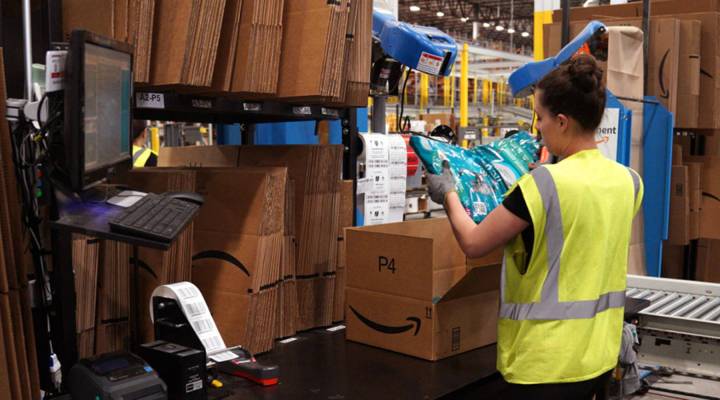
What happens when a company like Amazon raises wages everywhere?
What happens when a company like Amazon raises wages everywhere?

Amazon announced Tuesday that it’s raising the minimum wage it pays U.S. employees to $15 an hour. The company said more than 250,000 Amazon employees and 100,000 seasonal employees will benefit from the wage hike. Amazon’s new, higher pay will take effect on Nov. 1. We called Abigail Wozniak, a professor of economics at the University of Notre Dame who works primarily in the field of labor economics, to talk us through the news. The following has been excerpted from Wozniak’s conversation with Marketplace’s Amy Scott.
On which Amazon workers will feel the biggest impact:
So Amazon apparently has argued that a lot of their full-time warehouse workers or fulfillment center workers are already making on average over $15 an hour. So you’re right that they already have quite a large swath of their workforce who would not be affected by this. They specifically mentioned part time and temporary workers. They almost certainly will see some changes there. Those tend to be lower-paid positions than the full-time positions. This should also apply to Whole Foods cashiers. And average wages for cashiers in general in the whole United States, it’s about $10.60. So for those folks, this is likely a raise. But it’s very unlikely that this is touching a large set of their core fulfillment center workers.
On what will happen to communities with low minimum wages:
Certainly, there are places where this raise will have more buying power for the employees who are affected. That in general should be a good thing for those local economies. It also does put some more pressure though on firms that might not be at a point where they are ready to pay wages that are quite that high. So I think watching for effects on smaller businesses, their ability to recruit and retain workers in those kinds of local markets, would be an important thing to follow up after this announcement.
On the macroeconomic impact:
When pay expands for workers, we have more in kind of a total wage bill that can cycle back through the economy. That’s good in general for growth. Higher wages are, in a sense, a symptom of growth or a by-product of growth. So you want to see that everything is pulling together. We also want to keep in mind what’s happening with inflation. If wages go up, generally that’s great, but we have been experiencing some upticks in inflation and want to keep an eye on the real purchasing power of these raises for workers.
Click the audio player above to hear the full interview.
There’s a lot happening in the world. Through it all, Marketplace is here for you.
You rely on Marketplace to break down the world’s events and tell you how it affects you in a fact-based, approachable way. We rely on your financial support to keep making that possible.
Your donation today powers the independent journalism that you rely on. For just $5/month, you can help sustain Marketplace so we can keep reporting on the things that matter to you.


















